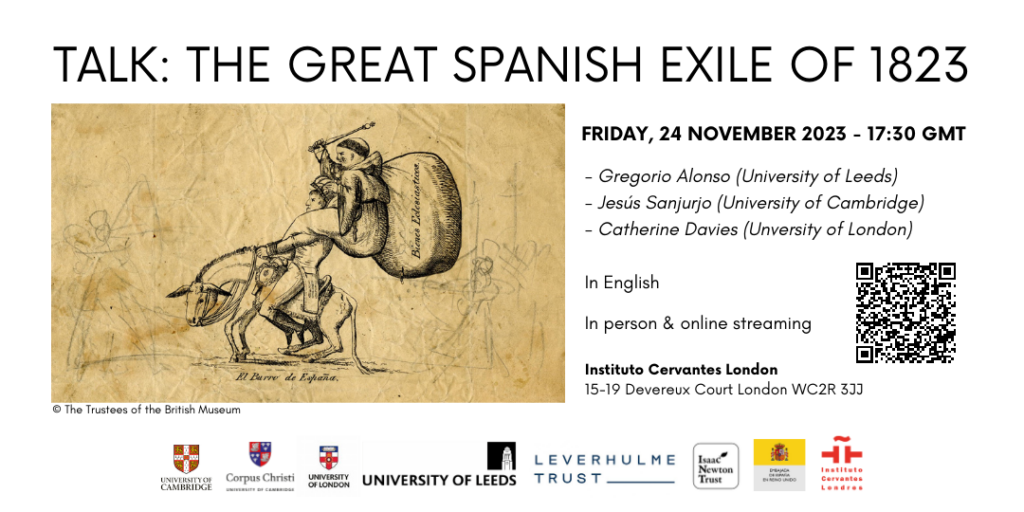Instituto Cervantes London hosts historical talk titled ‘The Great Spanish Exile of 1823’
Instituto Cervantes London welcomes Dr Gregorio Alonso (University of Leeds), Dr Jesús Sanjurjo (University of Cambridge) and Professor Catherine Davies (University of London) to explore a period of history not often discussed in a talk titled ‘The Great Spanish Exile of 1823’ on Friday, 24 November at 5:30pm.
The three academics will discuss this important event in Spanish history, which marked a period of political upheaval and forced departure of many liberal and progressive Spaniards, either by choice or to avoid political persecution.
This in-person and online activity is co-hosted by the Spanish Embassy to the United Kingdom and Instituto Cervantes London. «Since its creation, Instituto Cervantes London has been emphasising how the Hispanic presence in London adds value and contributes to the city’s cultural richness and diversity. Examples of this are the Cervantes Routes, specifically the ‘Routes of the Spanish exiles in London’ itineraries. On this occasion, three experts will tell the stories of the hundreds of Spaniards who were taken in and found protection,” says Víctor Ugarte, Director of Instituto Cervantes London.
Liberal exodus to London
After close collaboration between Great Britain and the Spanish authorities from 1808, the French occupation decreed by the Holy Alliance destroyed the liberal experience in September 1823. As a result, at least 1,000 Spanish families sought refuge in London.
Most of them lived in the London suburb of Somers Town, in the Euston-St Pancras area, where a tight-knit community quickly formed. The majority of the refugees were military officers, but noted intellectuals, politicians and skilled workers were also among them. Many were highly educated and put their minds to writing, translating and publishing to make a living.
Some of the most prominent liberal politicians and essayists of the time actively participated in a wave of new intellectual activity catalysed by London’s vibrant political and cultural life. Furthermore, London became a central hub for Spanish-speaking intellectuals from Spain and the Americas during this time.
Forced emigrations for ethnic and political reasons
Throughout history, Spain has witnessed various forced emigrations for ethnic and political reasons, such as the expulsion of Jews and Muslims who refused to convert to Christianity and the exile of more than half a million citizens in 1939.
«This was the case for more than 1,000 individuals who found refuge in London in 1823, following the restoration of the absolutist regime under Ferdinand VII. This episode has received some academic attention, but much remains unknown,» explains Jesús Sanjurjo, Early Career Fellow of the Leverhulme and Isaac Newton Trusts at the University of Cambridge and Corpus Christi College.
Spain became a focal point for British politics following the intervention of its armies in the war against Napoleon a few years earlier. Similarly, Britain had been regarded from Spain with a mixture of admiration, disdain and envy for some time, adds Sanjurjo.
“This is partly because the early industrialisation success of the British Isles was giving new impetus to their economy and international reputation. In 1823, London was competing on equal footing with Paris in its race to become the great metropolis of the West,” notes Dr Gregorio Alonso, Associate Professor in Hispanic History at the University of Leeds.
The city’s capacity to welcome and the material support it provided to political refugees was extended not only to the Spanish liberals fleeing Ferdinand’s repression, but also to the Greeks, Neapolitans, Prussians and Frenchmen who sought refuge in the British capital.
“This event will describe the men and women who found in London the protection and refuge that their homeland denied them and will also reflect on the difficulties they faced and the links they established with the people of London,” underlines Catherine Davies, Emerita Professor of Hispanic and Latin American Studies at the School of Advanced Study at the University of London.
Attention will also be paid to their relationship with the so-called American insurgents, who tried to forge alliances with the British authorities to throw off the Spanish imperial yoke. Thus, the event will explore the means by which London became the capital of Hispanic liberalism in the 1820s.
Entradas relacionadas
Etiquetas
exile Exilio exilio español historia History Instituto Cervantes de Londres Londres reino unido Spanish exile




Qué tipo de historias contarán los tres expertos durante la charla? Regard Biomedis